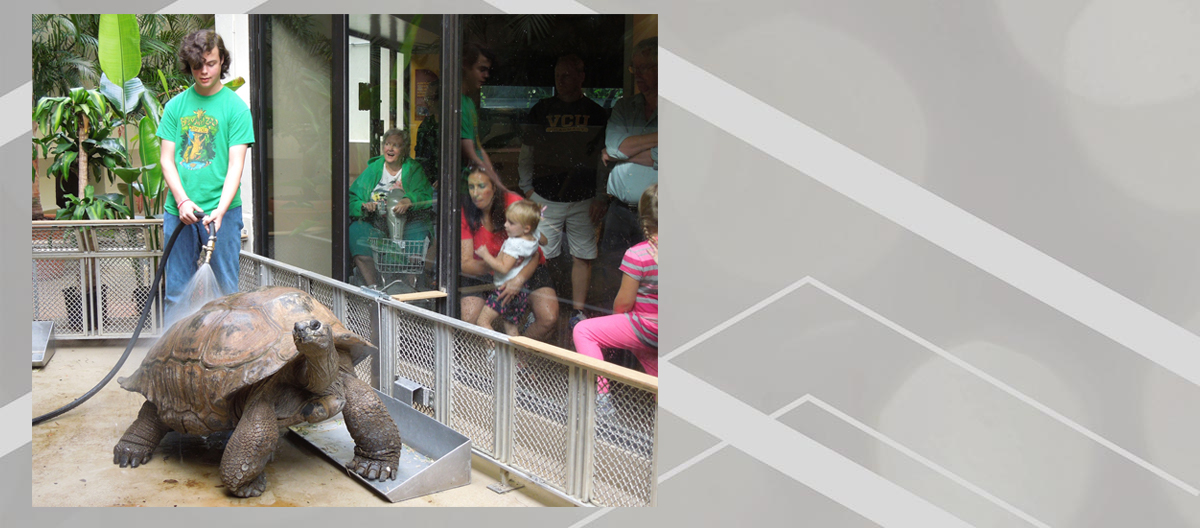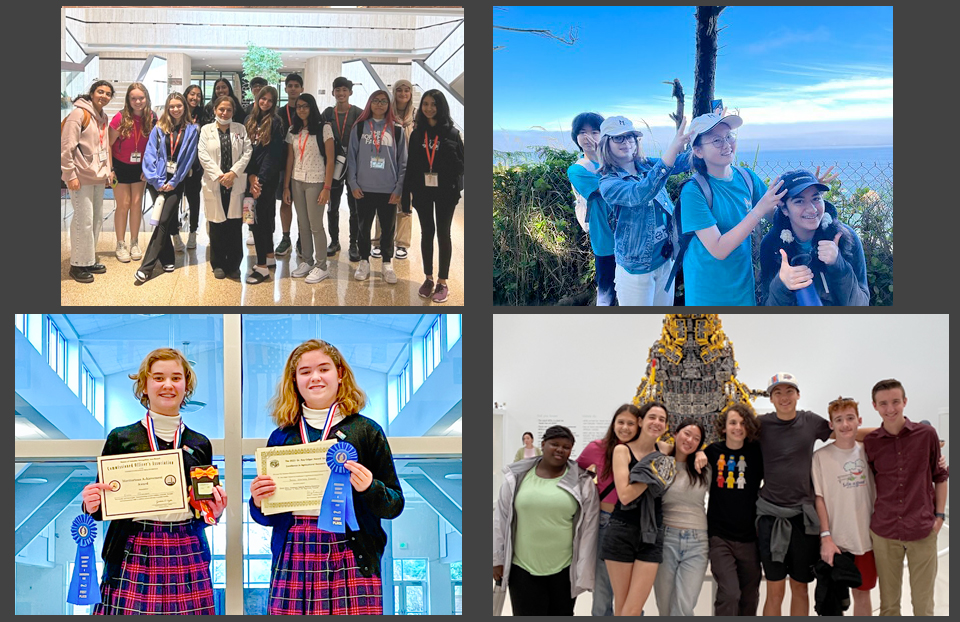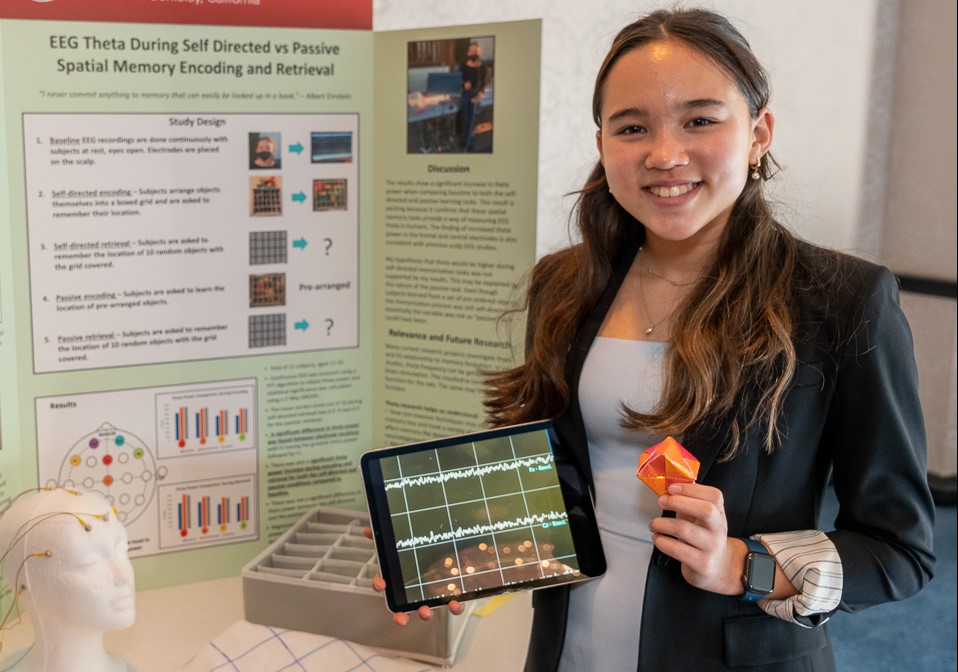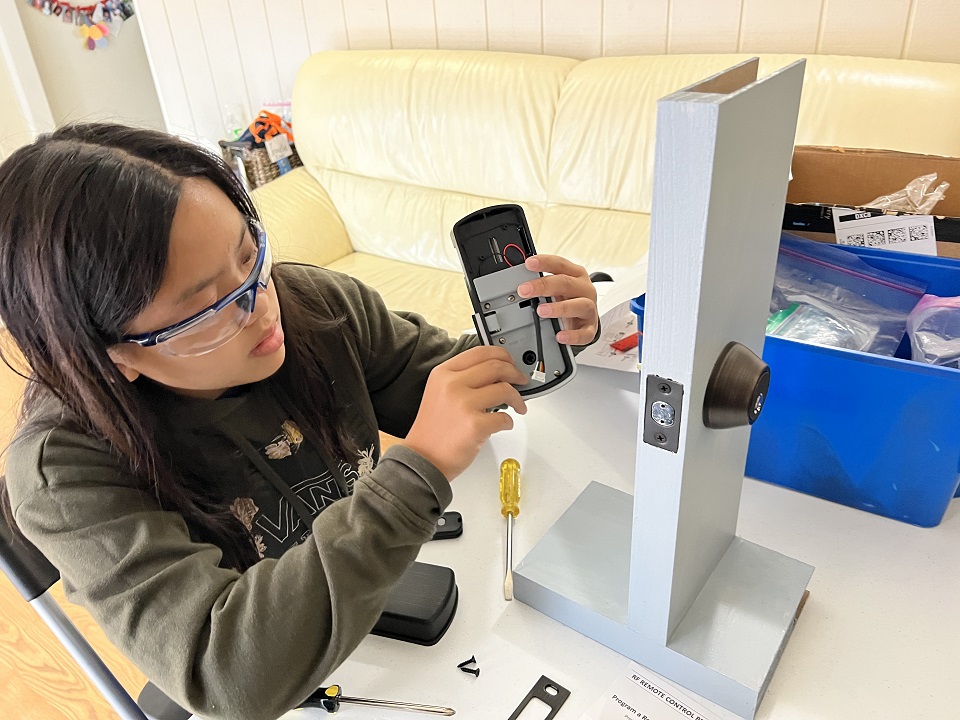“Rain Dance” of the Radiated Tortoise Leads Student to Top Award at Broadcom MASTERS

River Grace was the top winner of the 2013 Broadcom MASTERS, a national science, technology, engineering, and math competition for middle school students. Finalists are scored not only on the science fair project that qualified them for the competition, but also on their mastery of STEM principles, leadership, and communication skills during team challenges throughout the week. Below River describes what got him interested in his project, his experience at Broadcom MASTERS, and more.
Can you provide a short description of the research you presented at the Broadcom MASTERS?
One of the first things we did at the Broadcom MASTERS competition was practice our “elevator speech,” a 1-minute way of explaining your project to anyone that you might meet. I think all I said was, “I made tortoises dance.” As strange as this sounds, it’s true.
I actually discovered a very unique behavior in a critically endangered species from Madagascar, called the Radiated tortoise. I discovered that when it rains, these tortoises stand up as tall as they can on all fours, and then start a sort of rhythmic shuffling and wiggling of their legs. I call this the “rain dance.”
As I observed this happening in a breeding facility where the tortoises were kept, my fascination grew greater and greater. Soon, I had devised a series of experiments designed to determine the effects of age, sex, and temperature on the dance. I also came up with a way using different sensory aspects of the rain to try to determine the cause of the dance, and I tested many other species of tortoise as well. In the end, I found that there was no role of gender or the range of tested temperatures, but there was a difference with age – hatchlings did not perform the behavior at all, and as the tortoises aged they began the dance faster and continued it for longer. Also, none of the other species tested did the dance, and it appears that the important sensory cue is water moving across the carapace (the top of the shell), rather than just simply the tapping of raindrops on the shell or a flood of water underneath. With the tortoise’s status as critically endangered, this new information can help us in conservation efforts, and can put us a step closer to saving this species from extinction.
What was your experience being a Broadcom MASTERS finalist like?
It’s so hard to say this all succinctly, just because of how enormous and amazing the whole experience was. At first, I was worried about meeting all these new peers and trying to fit in. But by the time the first night of excitement was over, I knew that the following week was going to be a blast. Some of the most memorable experiences I had were meeting and talking with the President of the United States, playing board games and Apples to Apples with everyone in the game room, meeting new friends while walking up the steps to the Capitol Building, touring the amazing city of Washington DC, and of course participating in all the awesome challenges that we did over the course of the week.
How did you feel being announced as the top winner? What have your experiences been since then?
When I heard my name called at the award ceremony, I was completely shocked. I just remember thinking: “What? They picked me?” I honestly never expected it, because of how incredible all of the other finalists were. When they were about to announce the grand award, I honestly expected them to have picked Rebecca, or Dhruv, or Keoni, or any of them really. Everyone’s projects were amazing, and they were all fantastic scientists and engineers. It’s actually a little sad that everyone couldn’t receive this award. Since then, I have used this as an example for others – I’ve given a number of inspirational speeches to say that if you put your heart and mind into something you are passionate about, the same can happen to you.
You spent some time at the National Zoo while you were in town for the Broadcom MASTERS as well. Can you tell us about what you did there and how you have worked with other organizations, like the Brevard Zoo?
I was very fortunate to be able to work at the Brevard Zoo, and even more fortunate to get a chance to work at the National Zoo. At each of these, I was able to go into the display for the tortoises and test them using my normal experimental procedures. This was fantastic, not only to gather more data from new test subjects, but also to make new connections with fellow tortoise experts and lovers. The story of my National Zoo experience is actually very incredible. I went at first just to see if I could talk to anyone about behaviors they’d seen the tortoises doing naturally. To make a long story short, I had the honor of meeting Dr. James Murphy, a world-renowned herpetologist and Curator of Reptiles at the National Zoo. The next thing I knew, he and three members of his crew were leading me on a behind the scenes tour of the reptile house, and then I got to test a few Radiated tortoises and two other endangered tortoise species as well. In the end, it was an incredible experience.
How did you initially become interested in science and this topic specifically?
I have loved tortoises and science in general for as long as I can remember. My family has always loved the outdoors and I’ve had the great fortune to be able to travel to many amazing places including the Arizona desert, the Maine woods, the Cayman Islands, the Peruvian Andes, and the Amazon rainforest. These wonderful adventures just fed my sense of curiosity, my love of nature, and my understanding that conservation is desperately needed today. My father is a biologist who sometimes works with reptiles, so I have been exposed to them ever since I was born. From a very young age, his interest in these animals created a fascination in me, and I have loved them ever since. But this “rain dance” was something special. I had never heard of anything similar to it, and I had never dreamed of seeing anything like it. So of course, when I recognized it as something unique I was instantly curious. Very soon, I was hooked.
How has doing original research and participating in events like the Broadcom MASTERS affected you?
Being involved in scientific research and science competitions, like the science fair and Broadcom MASTERS, has become some of the largest and most important things in my life. They have taught me how to think scientifically, how to design ways to solve problems, how to present scientific information to groups of people, how to communicate my ideas efficiently and effectively, and an innumerable amount of other life skills. The organization of finalists into teams at Broadcom MASTERS fostered my sense of cooperation and taught me how to work well with others to yield the best possible results. I am confident that my great experiences in science competitions will help me later in life.
What have you learned about STEM principles through participating in the Broadcom MASTERS?
The Broadcom MASTERS competition not only taught me more about how to work well in groups, but I also learned an enormous amount about what we call STEM principles. Going in to the competition, I thought I knew a good bit about concepts in Science, Technology, Engineering and Math. Walking away, I realized that my knowledge had at least doubled, if not tripled. The combination of intriguing challenges designed to test how you think, combined with the influence of the 29 other bright minds around me, really caused me to rethink what I knew, and to consider new ideas. The whole experience has greatly broadened my horizons and helped me to improve the way I think about problem solving in STEM fields.
Do you have any advice for young students interested in science? For finalists in next year’s Broadcom MASTERS?
For all of you young scientists and engineers out there like me, my best advice is to follow your passion. I know it’s been said many times before, but it is so true. If you are passionate about science, technology, engineering, or math, then you are in luck. There are so many opportunities out there like Broadcom MASTERS to help you understand your true potential, and as long as you are doing something that you love then you will be happy and successful. This said, I also highly recommend that you try as hard as you can to get involved in Broadcom MASTERS. It was truly a life changing experience, and I would tell anyone interested in STEM principles to try to be able to take part in this incredible experience.
As for those lucky 30 of you that will attend future Broadcom MASTERS events, I think it’s most important just to enjoy the experience. Don’t get caught up in competition or worry, just let your inner science nerd come out and you will be at home with everyone else. When you first get there, you will meet 29 other people your age that you don’t know. By the end of the week, you will have 29 new close friends who are just like you. By the last day of our Broadcom MASTERS, no one wanted to leave. Finally, it is essential that you stay in contact with these new friends. After it was all over, I started a Skype group for all of the Broadcom MASTERS, and we regularly speak and discuss our future science endeavors. I am even traveling across the country in just a few weeks to visit one of the new friends that I met at the competition. The people that you meet at the Broadcom MASTERS competition are some of the brightest minds of our generation, and the lifelong connections you will make are going to be of utmost importance to you farther down the road.
My best advice is to follow your passion. There are so many opportunities out there like Broadcom MASTERS to help you understand your true potential, and as long as you are doing something that you love then you will be happy and successful.
Are you continuing your research? And/or what are you working on now that is STEM-related?
As a matter of fact, I am continuing my research for this year’s science fair. I don’t want to give too much away, but I am currently working to determine whether the Radiated tortoise has color vision, how they use vision to find food, and understanding how knowing more about their vision can aid in their conservation. I am currently writing a scientific paper on my previous year’s research for submission to an international scientific journal for publication. I definitely plan to do more rain dance experiments in the future!


